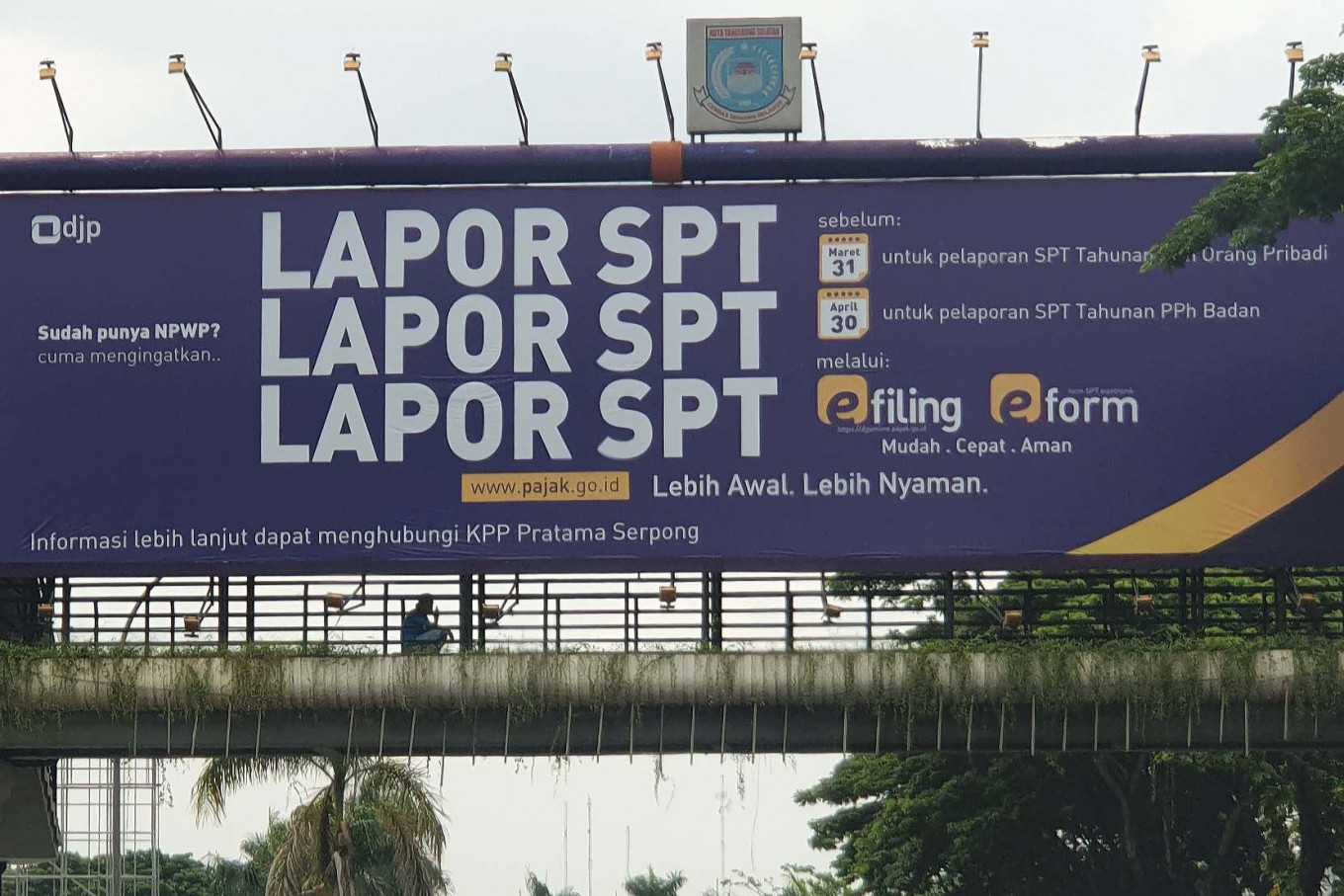Popular Reads
Top Results
Can't find what you're looking for?
View all search resultsPopular Reads
Top Results
Can't find what you're looking for?
View all search resultsIndonesia should turn to VAT, digital tax to offset shortfall in state revenue: Analysts
Change text size
Gift Premium Articles
to Anyone
I
ndonesia should turn to value-added tax (VAT) and large tech companies to address the widening shortfall in state revenue, analysts have said.
Danny Darussalam Tax Center (DDTC) research partner Bawono Kristiaji said VAT and individual tax were generally more resistant to economic shocks like those that hit Indonesia during the 2008 crisis.
“VAT is more resistant to economic shocks than other tax sources,” Bawono told a virtual discussion on Tuesday. “There are two prerequisites: purchasing power must be maintained and the supply side shock did not heavily affect goods prices.”
However, he went on to say, the economic shock caused by the COVID-19 pandemic that includes mass layoffs could have a severe impact on both VAT and personal income tax. “The government should look to save, renew and expand VAT as the main tax source.”
Indonesia’s total tax revenue reached Rp 241.6 trillion (US$15.48 billion) in the first quarter this year, down 2.5 percent from the same period last year, as corporate income tax and import tax dropped significantly amid the decline in business activities.
Tax revenue is expected to reach Rp 1.25 quadrillion in 2020, according to the government’s latest projection stipulated in Regulation in Lieu of Law (Perppu) No. 1/2020, down 23.65 percent from the 2020 state budget target.
VAT, the biggest tax contributor, grew by more than 10 percent year-on-year (yoy) to Rp 51.63 trillion in the first quarter, while personal income tax grew by nearly 5 percent to Rp 36.58 trillion.
The virus has infected more than 2.5 million people around the globe, including 7,135 people in Indonesia as of Tuesday. Indonesia has introduced partial lockdowns in Jakarta and other cities to halt the spread of COVID-19. The harsh impact of the emergency measures has crippled almost all business sectors.
This has upended supply chains, crushed demand for goods and taken a toll on tax revenue for the government.
Bawono welcomed the government’s decision to tax tech firms, saying that would make sense, as tech firms enjoyed significant income in Indonesia. “This would help compensate for lost revenue and anticipate the negative COVID-19 impact on state revenue.”
The Perpres issued on March 31 stipulates that online products and services provided by offshore companies with “a significant economic presence” will be subject to paying taxes as authorities target a bigger slice of revenue from the countries’ fast-growing digital market.
Meanwhile, Tax Office spokesperson Hestu Yoga Saksama said the pandemic would erase up to Rp 8.87 trillion of VAT income, while the government’s move to make the import of medical devices duty-free would erase up to Rp 6.9 trillion in state income.
“However, the realization would depend on real transactions,” Hestu told Kontan recently.
Through Finance Ministry Regulation No. 28/2020, the government has lifted import duties for medical devices including medicines, vaccines and testing kits to better equip the country in its fight against the pandemic.
The regulation waives import and income tax requirements for government institutions, hospitals and other parties involved in the fight against COVID-19.
Indonesia’s budget deficit is expected to widen to 5.07 percent of the country’s GDP this year as the government spends heavily to help businesses, workers and households through the COVID-19 crisis.
The government has set aside Rp 436.1 trillion in extra spending to cope with COVID-19. The funds, which account for 2.5 percent of the country’s GDP, would be allocated for healthcare spending, social safety nets and business recovery programs.
It will also grant larger tax breaks to cover 11 business sectors similar to the incentives designed to allow manufacturing companies to weather the economic impact of the COVID-19 pandemic, including personal income tax exemptions, import duty deferrals and 30 percent corporate tax discounts.
The head of the Finance Ministry’s Fiscal Policy Agency (BKF), Febrio Nathan Kacaribu, has voiced concern that the government’s stimulus may be insufficient to prevent an economic meltdown caused by the COVID-19 pandemic.
“We have doubts that the stimulus packages will be enough,” Febrio told reporters during a teleconference. “The government will anticipate this because there are some discouraging signs.”










